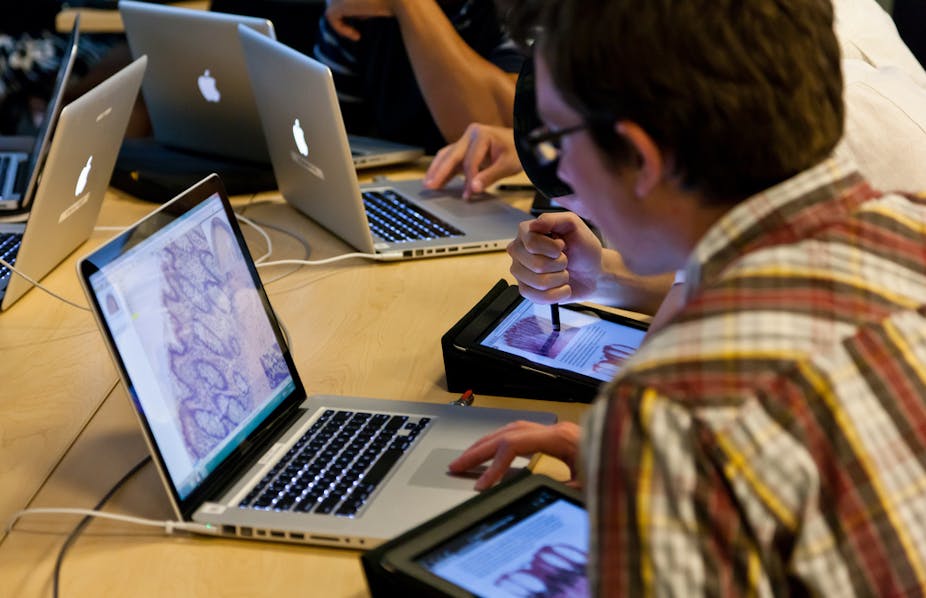My childhood was influenced in some measure by two great icons that no longer exist. The first was Kodak – I adored my [Box Brownie](http://en.wikipedia.org/wiki/Brownie_(camera) and I still have the wonderful grainy black and white pics. The second great icon was larger than Kodak: it was a stack of books known as Encyclopaedia Britannica.
The childhood I experienced was not unusual. For baby boomers, Kodak was our memory collector of choice and Encyclopaedia Britannica the Google of its day. But neither has survived the remorseless advance of the digital economy.
The invention of the internet, the inevitable convergence to a mobile phone or tablet, and the discovery of how to monetise a digital transaction have been death blows to these two icons and to so many others we can all name. And this transformation is far from finished.
Over the last few months most of us who work in higher education, as well as those who watch and comment on what we do have been fascinated by a singular topic: the MOOC.
This abbreviation – for Massive Open Online Course – is a term likely to enter into our common vernacular. A MOOC is a course or unit accessible, usually with no prerequisites, to anyone who wishes to enrol, usually for free, and with self-assessment or peer assessment along the way. Many now are being offered by household name universities who may not give you credit towards a degree, but will often award certificates of participation, or even a grade.
Most MOOCs are now delivered by acknowledged experts and outstanding teachers. They are very new, and no-one yet knows what they will mean or what role they will play. But many already believe that Pandora’s box has been opened.

The rise of open and online courseware
Open courseware has been around for many years, following the example of MIT and, more recently iTunes U. MIT and Harvard announced with huge fanfare the launch of edX, a new learning platform allowing free access to their best courses – with certification of completion thrown in for a “small fee”.
Equally as compelling, small start-up Udacity launched in June with its course in machine learning.
Suddenly, in Geelong we had access to a world authority through real time face to face connection, so long as you could connect to the internet. Over 100,000 enrolled, including myself. Not everyone finished but it started a different way of learning. Since then Coursera has exploded with an increasing group of universities (sixteen as of today, including institutions from the United States, Scotland and France) joining and putting their own MOOC courses in the cloud—for free. To date over 1 million people have signed up.
A passion for learning
Are these new students really learning? We don’t yet know. But what we do know is that large numbers of the capable and curious have bothered to take the first step toward a different way of approaching learning.
None of these MOOCs leads to a degree - yet. You do not get a cheap award from an Ivy league institution. But it has grabbed our attention, along with TED talks, the Kahn Academy and many more education start ups.
There are suddenly many more channels to connect to sophisticated learning from the world’s best teachers. With MOOCs, Google, Open Educational Resources, and many new open source academic journals, universities are no longer the sole channels for the best content.
Panacea or poison?
For the first time in our existence, some are questioning the university’s purpose and future.
Is the world as we know it about to end? The doomsayers have written extensively.
However, let’s reflect: for many years, we have said we want our students to be lifelong learners and creators of new knowledge to solve complex, interdisciplinary and ill-defined problems. Tomorrow’s knowledge of course builds on what we know today.
At Deakin university we have focused increasingly on outcomes and assessment to enable capable graduates as employable and effective citizens. Clearly MOOCs are not the panacea, or a replacement, but they do contribute to a worldwide learning community, hungry to learn and engage with others who wish to do likewise.
We know for sure the digital economy is as inexorable as the industrial revolution in its day. Other industries — newspapers, retail, book publishers and sellers — are all changing their practices and business models. Those in higher education would be foolish to ignore it even though outcomes are not clear and many uncertainties exist.
Into the great unknown
The Asian century is upon us. This disruptive innovation which may morph to a new status quo is Australia’s chance to have a go, to do education differently, especially in our region.
Some of the current innovations in the United States and elsewhere will test the rules imposed on universities here, including the new regulatory body TEQSA as well as the Australian Qualification Framework (a thought that makes even me weak at the knees).
But everything is possible when disruptive innovation is at play. Think Apple. Think Amazon Books.
MOOCs, and all their iterations, are an opportunity to re-imagine how we can deliver excellent learning outcomes in new, more accessible and engaging ways, fit for 21st century learners and graduates.
We know our higher education system, due to regulatory and financial pressures, is straining at its seams. But these new technologies and everything associated with open source prompts us to think differently about how and what we do.
Its affects are unknown but if universities are allowed to innovate they may well turn out to be good for staff, good for students and hopefully, good for institutions too.

